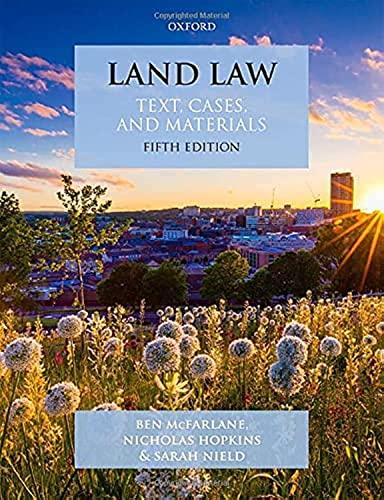Question
1. Daniel is a 17-year old Coloradan. He received his license to drive just a few months ago. Since that time, he's become really interested
1. Daniel is a 17-year old Coloradan. He received his license to drive just a few months ago. Since that time, he's become really interested in "street racing" after watching the Fast and Furiousmovie series. One night in Denver, he challenges his friend to a race. The race is simple: Whoever can drive from Denver to the Academic Offices Building's parking lot on UCCS in the least amount of time wins. During the race, Daniel loses control of his car in a construction area on I-25. His vehicle rolls over a few times and hits a construction worker who was on break on the shoulder of the road. The worker dies. Daniel already has two tickets for speeding, but no other crimes on record. He's an "A" student at Discovery Canyon Campus high school. He is of average maturity for his age. He's really sorry and promises not to do it again (though he made the same promises each time he got a speeding ticket). You're the prosecutor, and you've charged involuntary manslaughter in similar cases. However, in all your previous cases, the defendant as at least 18 years old. The victim's family asks you to treat Daniel as an adult, because they believe that the juvenile justice system is too soft on crime. The victim's family believes Daniel's actions caused adult consequences and that he should face all possible legal consequences for what he's done. You can file in juvenile court or you can "direct file" in the nearest circuit court, thereby treating Daniel as an adult. Daniel asks you to keep his case in the juvenile justice system. What will you do? Why? Apply the factors we discussed in our video, please.
2. regarding juvenile justice for a reflective essay (one thorough, well-written paragraph will suffice). Describe the issue and address the ethics of the issue you've selected using at least three normative approaches. Whatever topic you choose, be sure to describe the issue, and then describe and apply three normative ethical approaches. Here are two ideas, both of which are discussed in our module:
- The felony murder rule: Juveniles are disproportionately impacted by the felony murder rule, prompting many advocates for child welfare to call for its abolition. Describe the felony murder rule, and explain whether it's ethical or not, using at least three ethical approaches.
3.Describe the process of mummification. What initially prompted Egyptians to begin this practice? How did it differ between wealthy and poorer individuals? What was its ritual purpose?Do a single page essay for full points
4.If you Google "Pyramids," some of the results are pseudoscientific explanations about how the pyramids werereally built by giants, extraterrestrials, and so on. Why do you think there is such a market for "alternative" (to put it mildly) explanations in archaeology? Further, was it built by aliens? What about slaves? What does archaeology say about this topic?
Step by Step Solution
There are 3 Steps involved in it
Step: 1

Get Instant Access to Expert-Tailored Solutions
See step-by-step solutions with expert insights and AI powered tools for academic success
Step: 2

Step: 3

Ace Your Homework with AI
Get the answers you need in no time with our AI-driven, step-by-step assistance
Get Started


